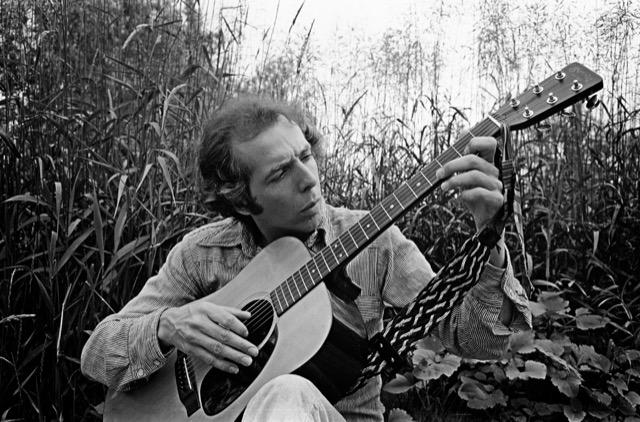By John Einarson
Any mention of the thriving coffeehouses in Winnipeg during the ‘60s and ‘70s always elicits one name: Jim Donahue. He was the kingpin on the local folk music scene. “Jim set the standard for every other folk performer in town,” notes younger brother, musician Dan Donahue. “He sang well, played well and engaged people in a way that others didn’t. He had integrity and a personality as an artist.”

“Jim was a two-sided folk singer,” reflects contemporary Bobby Stahr, “as he had a wealth of traditional music stored up in him as well as being one of the finest poet/singer/songwriters I ever heard. You could feel the Civil War in the air when he played The Spoon River Anthology or the Highlands when he crooned Wild Mountain Thyme. He made movies in your mind.”
As Celtic music maven Loreena McKennitt affirms, “Jim was one of a handful of musicians in Winnipeg whom I admired greatly. A salt of the earth and thoughtful musician and lyricist, I recall quite fondly enjoying his music in various coffee houses or at the Winnipeg Folk Festival and benefited from his curiosity and his intellect in our various conversations.”
Born in Ottawa, Jim moved to Winnipeg at age two when his father took a position teaching architecture at the University of Manitoba. The Donahue children (Jim and Dan have a younger sister) grew up in a culturally stimulating household. “Music was always played at home although neither parent played themselves,” notes Dan. “It was primarily the black music of the time and the great operas which made for an interesting exposure to things.”
Jim came of age with the folk boom that exploded in 1958 with The Kingston Trio’s hit Tom Dooley. “There was a real sea change with that and I was at the right time for all that because I could sing and play guitar,” he acknowledges. Graduating from St. Paul’s High School, Jim opted for a more eclectic life over academia.
Coffeehouses like the Wyse Eye, Wing’d Ox, Latin Quarter and Ting offered everything from folk and bluegrass to jazz, blues and poetry. “There were all these church basement coffeehouses around town,” states Jim. “There was no money in it but it was fun.” Nonetheless he managed to sustain a career. He was also a regular at the 4D coffeehouse out by the University of Manitoba. “It was quite a sophisticated place,” he notes. “There were a lot of artists who came in from New York to play there. I met Don McLean [American Pie] there and Len Chandler. I used to see Neil Young singing at the 4D. He was so focused back then.” For a time Jim played the folk clubs of Greenwich Village as well as Toronto’s Yorkville before returning to Winnipeg. Bobby Stahr remembers, “Upon his return from a trip out east Jim played a set at the Latin Quarter on a Sunday evening and sang Suzanne by Leonard Cohen and the applause afterwards was deafening.” Indeed, Cohen was an early mentor. “Leonard played a concert at the university and was singing his own poetry and blew me away,” recalls Jim. “Afterwards I played him some of my songs and he was very kind and encouraging to me.”
A true renaissance man, Jim’s interests embraced poetry and literature, history, photography, architecture and astrology. In the latter ‘60s he and two friends opened the Poseidon Book Store on Osborne Street near Confusion Corner. He also composed original music for the Contemporary Dancers and several CBC music and children’s productions. He played the inaugural Winnipeg Folk Festival and appeared four more times, opened concerts for the likes of Leon Redbone, John Mayall’s Bluesbreakers, and Procol Harum, played a youth rally for Prince Charles and Princess Anne, and appeared regularly at Main Street club The Blue Note Café in the 1980s. In 2005 his photos were published in Retropeg: Archival Photography of Winnipeg in the 70s. Although he never recorded an album, his composition “Two Diamonds” still resonates for many.
Reminded of his stature on the local music scene, Jim demurs. “It almost seems like another life. It was only one facet of who I was. It was a youthful time and music was a big part of it. Everything seemed interesting. We were so fortunate to be around at that time.”
Jim Donahue passed away on February 21, 2018.
